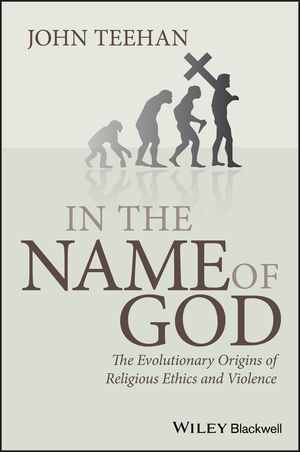|
Textbook
In the Name of God: The Evolutionary Origins of Religious Ethics and ViolenceISBN: 978-1-4051-8381-9
Paperback
288 pages
April 2010, ©2010, Wiley-Blackwell
 This is a Print-on-Demand title. It will be printed specifically to fill your order. Please allow an additional 10-15 days delivery time. The book is not returnable.
Other Available Formats: Hardcover
|
||||||
Connect with Wiley Publicity
The place and value of religious belief in our modern world is becoming increasingly questionable. Religion is typically presented as a force for good in the world, and yet the impact of religious convictions often has a divisive and violent effect on society and humanity. And while it is sometimes legitimate to distance religion from the people or groups who commit heinous acts in its name, in his new book In the Name of God: The Evolutionary Origins of Religious Ethics and Violence (May 2010, U.S.; March 2010, UK) John Teehan points out that this distancing is altogether too common and too pat.
Rather, based on the findings of evolutionary psychology, Teehan demonstrates that people act from a complex set of evolved moral and cognitive motivations. An in-depth analysis of both the 10 Commandments and the moral teachings of Jesus reveals that their construction is based largely on the foundations of our evolutionary heritage, and that the representations of both God and Christ found in the Bible also show signs of being shaped by our evolved mind.
A central characteristic of our evolved psychology is the innate tendency to divide the world into in-groups (which we morally favor) and out-groups (which lie beyond the reach of our moral concern). This moral divide motivates some of the noblest acts of sacrifice and love, but it also motivates some of the worst acts of inhumanity. Both motivations are found within the structure of religious morality. Teehan further argues that although Christianity is claimed to be unique in its all-inclusive moral vision, it too is grounded in an in-group v. out-group mentality.
There is no doubt that the recent conflicts in the Middle East have religious components. Teehan makes the case that the justifications for these acts can be found in the moral logic of Judeo-Christian and Muslim religions. As evidenced by the words of President Bush and Osama bin Laden, both see the conflicts in religious terms and each clearly believes God is fighting on the side of their own in-group.
Teehan poses the dilemma: While religion has helped us to evolve socially, at what cost do we allow religion to continue to shape our morality? On the other hand, is it possible to move beyond religion, and if so, what would be the costs? These are vital questions, with no easy answers. Teehan advocates adopting moral pragmatism, and suggests that humanism, in both religious and secular forms, offers the best hope to move beyond the divisiveness of religious conflict.
This book is part of the Blackwell Public Philosophy Series which takes seriously the idea that there is a need and demand for engaging and thoughtful discussion of topics of broad public importance. Written in an accessible, jargon-free manner by internationally renowned authors, each book is an invitation to the world beyond news flashes and sound bites and into public wisdom.



